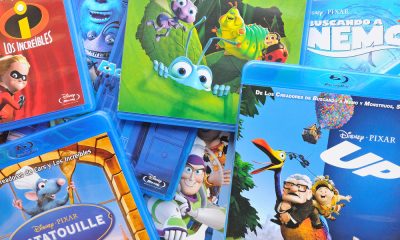5 Best TED Talks That Will Transform Your Thinking, Part I
The best TED Talks are Miracle Grow for the body, mind and soul!
They are cutting edge philosophy, psychology, science and insight, among many other wonderful “ideas worth sharing.”
The very first TED Talks were posted online in July 2006 and continue to serve as a phenomenal resource for seekers like us who are striving to make ourselves and this world a better place.
I never run out of curiosity, or the need to grow into someone I like more than the day before.
As a teenager, I had two choices.
I could cave and let hard situations and obstacles drive the essence of me deep into the ground, where not even a flicker of light existed.
The alternative was to start asking questions, to seek understanding and greater insight, and to let myself learn from events that might otherwise keep me in dark places.
I searched for answers in books on spirituality, religion, relationships, psychology and all other things self-help.
I attended seminars, twelve-step groups, webinars, and creative circles to untangle the beliefs I learned early—beliefs and philosophies that no longer served me.
Eventually, I discovered TED Talks, which continue to disclose the answers I seek.
Whether you’re new to TED or an avid fan, the following best TED Talks are a must-watch and worth repeating.
I had a difficult time narrowing down my favorites, so these five are the first batch, with more to follow.
Best TED Talks That Will Transform Your Thinking
1. Tony Robbins: Why we do what we do
TED Description: Tony Robbins discusses the “invisible forces” that motivate everyone’s actions — and high-fives Al Gore in the front row.
One of the first six TED Talks posted online in July 2006, Tony Robbins’s talk is worth watching again today.
Tony reveals his thirty-year obsession about what makes the difference in the quality of people’s lives.
He is quick to point out how many of us have figured out the achievement part of life, but very few of us have learned how to become fulfilled and impactful to the world around us.
“I look at life and say there are two master lessons.
One is: there’s the science of achievement, which almost everyone here has mastered amazingly.
How do you take the invisible and make it visible?
How do you make your dreams happen?
Your business, your contribution to society, money—whatever, your body, your family.
The other lesson that is rarely mastered is the art of fulfillment.
Because science is easy, right?
We know the rules, you write the code and you get the results.
Once you know the game, you just up the ante, don’t you?
But when it comes to fulfillment — that’s an art.
The reason is, it’s about appreciation and contribution.
You can only feel so much by yourself.”
Growing up feeling lost with a sense of never really belonging, I made an early decision to master achievement.
I made the best grades, won the contests, got great jobs and blew the company records off the wall.
I had everything I ever wanted, so why wasn’t I happy?
I hadn’t yet tapped into the second key: fulfillment.
We have to nurture the desires of our souls in a way that spills out and touches the people around us in a significant way.
If you’re not there yet, don’t sweat it.
You’re still gathering lessons so keep searching.
2. Brene Brown: The power of vulnerability
TED Description: Brené Brown studies human connection — our ability to empathize, belong, love.
In a poignant, funny talk, she shares a deep insight from her research, one that sent her on a personal quest to know herself as well as to understand humanity.
A talk to share.
Are you one of the more than twenty-three million viewers who’ve seen this TED talk?
Have you had the pleasure of watching Brene Brown demonstrate why it’s so powerful to be vulnerable, and what some might confuse with being “weak?”
As Brene Brown dug into her research and focused on connection, she realized how many of us actually feel disconnected, and what’s worse, we are ashamed of that, adding to our overall bad feelings.
“And shame is really easily understood as the fear of disconnection: Is there something about me that, if other people know it or see it, that I won’t be worthy of connection?
The things I can tell you about it: It’s universal; we all have it.
The only people who don’t experience shame have no capacity for human empathy or connection.
No one wants to talk about it, and the less you talk about it, the more you have it.
What underpinned this shame, this ‘I’m not good enough,’ — which, we all know that feeling: ‘I’m not blank enough.
I’m not thin enough, rich enough, beautiful enough, smart enough, promoted enough.’
The thing that underpinned this was excruciating vulnerability.
This idea of, in order for connection to happen, we have to allow ourselves to be seen, really seen.”
Oh did this ever touch a nerve in me the first time I listened!
I understand shame and feeling inferior.
My solution?
To act confident and to accomplish great things!
But that didn’t solve anything and in fact, it only buried my real problem which made it that much harder years later to excavate my soul and tell myself it’s okay to have the need to belong and feel connected.
We weren’t meant to live life separate from everyone else, and we certainly weren’t born unworthy and fearful.
Please watch this (again) as Brene shares the key differences between those of us who battle a grave sense of unworthiness and shame and those who don’t.
As a bonus, she manages to convey this soulful topic with laugh-out-loud humor.
Watch!
3. Amy Cuddy: Your body language shapes who you are
TED Description: Body language affects how others see us, but it may also change how we see ourselves.
Social psychologist Amy Cuddy shows how “power posing” — standing in a posture of confidence, even when we don’t feel confident — can affect testosterone and cortisol levels in the brain, and might even have an impact on our chances for success.
What I love about TED Talks is that many of them seem like good common sense but they are backed by science.
It’s the best of both worlds!
Amy Cuddy is a social psychologist who overcame a debilitating car accident that caused her identity and worthiness to plummet.
Her research is focused on nonverbal body language, but not so much what we observe in others, but what our brains conclude from our own nonverbal cues, including our thoughts and posture.
“So when we think of nonverbals, we think of how we judge others, how they judge us and what the outcomes are.
We tend to forget, though, the other audience that’s influenced by our nonverbals, and that’s ourselves.
We are also influenced by our nonverbals, our thoughts and our feelings and our physiology.
…When I tell people about this, that our bodies change our minds and our minds can change our behavior, and our behavior can change our outcomes, they say to me, ‘It feels fake.’
Right?
So I said, fake it till you make it. …
She comes back to me months later, and I realized that she had not just faked it until she made it, she had actually faked it until she became it.”
One of the many ways I’ve rebuilt my psyche from a troubled past is by using positive affirmations and visualization.
In fact, the first few mantras I learned as a teenager in twelve-step recovery was, “ Fake it till you make it,” and, “Take the actions first, and let the feelings follow.”
When our internal software is critically flawed, we can keep limping along with broken beliefs or we can take an active role in re-programming our internal language.
But this TED talk goes well beyond basic affirmations.
Amy offers an engaging talk and demonstrates scientifically how a confident person shows up in the world, versus someone less confident.
She offers a proven technique which only takes two minutes a day to literally change your hormone levels and boost your esteem.
You will present an improved version of “you” to the world, yes, but most importantly … to YOURSELF.
Our sub-conscious believes what we tell it and I think yours is telling you to watch this TED talk (again) right now!
4. Andrew Solomon: How the worst moments in our lives make us who we are
TED Description: Writer Andrew Solomon has spent his career telling stories of the hardships of others.
Now he turns inward, bringing us into a childhood of adversity, while also spinning tales of the courageous people he’s met in the years since.
In a moving, heartfelt and at times downright funny talk, Solomon gives a powerful call to action to forge meaning from our biggest struggles.
Andrew Solomon’s TED Talk made me feel like I was listening to a gentle giant—gentle in nature and giant in reach.
His message of compassion shifted perspective and gratitude boldly amplifies a message so desperately needed in a world filled with daily tragedy and injustice.
His talk brings up a heated topic widely disagreed upon in our society.
This serves to only further demonstrate the purpose of his talk and offers us an even greater challenge.
While we may not understand or always agree with our neighbors, we can all strive for more empathy for one another.
“As a student of adversity, I’ve been struck over the years by how some people with major challenges seem to draw strength from them, and I’ve heard the popular wisdom that that has to do with finding meaning.
And for a long time, I thought the meaning was out there, some great truth waiting to be found.
But over time, I’ve come to feel that the truth is irrelevant.
We call it finding meaning, but we might better call it forging meaning.”
This TED talk could aptly be named, “Finding the Gift,” the title of my own book and a topic that is near and dear to my heart.
We all face adversity, but it’s how we use that adversity that really defines us.
Do we let it destroy us?
Do we believe the lies it told us?
Or do we choose instead to see the opportunity for growth within it?
I found the use of “forge” to be curious so I looked up its definition: make or shape (a metal object) by heating it in a fire or furnace and beating or hammering it (Oxford Advanced Learner’s Dictionary).
Woah!
How better to describe taking the tough stuff in life through a painful transition process, to ultimately mold it into something more desirable?
Gifts are often gift-wrapped in obstacles, so leave no gift unopened.
It may not be obvious at first glance, but if we keep looking, chances are good that with enough time and perspective, we can find reasons to be grateful in all things.
Andrew demonstrated that well.
Even when I can’t find the gift, I choose to believe it’s there anyway—in some way being the lesser of two evils, in teaching me something I need to know, or simply in shaping my character to handle challenges down the road.
Adversity makes me more relatable to my fellows and can serve as a point of connection and hope.
We can’t change what’s happened to us, but we can change how we think and feel about it, and how we use it for good.
Watch and be inspired to transform your biggest struggles too.
5. Steve Jobs: How to live before you die
TED Description: At his Stanford University commencement speech, Steve Jobs, CEO and co-founder of Apple and Pixar, urges us to pursue our dreams and see the opportunities in life’s setbacks — including death itself.
Seriously?
I don’t even know where to begin on this one, much less decide which quotes to bring out.
I’d prefer to just give you the entire transcript, it’s that good!
Steve Jobs tells three stories about his life to illustrate three key lessons: connecting the dots, love and loss, and what we can learn from accepting that death is unavoidable.
Steve Jobs had the courage to find a career he loved, rather than simply follow suit with what everyone else was doing.
We learn how this college drop-out discovered what he was passionate about pursuing.
He never settled for anything less and encourages others to keep looking if they haven’t found it yet.
Steve Jobs trusted his gut and arguably accomplished far more in his life following his heart than had he stuck to a prescribed, one-size-fits-all path.
“And much of what I stumbled into by following my curiosity and intuition turned out to be priceless later on …
None of this had even a hope of any practical application in my life.
But ten years later when we were designing the first Macintosh computer, it all came back to me….
Of course, it was impossible to connect the dots looking forward, when I was in college, but it was very, very clear looking backwards ten years later.
Again, you can’t connect the dots looking forward.
You can only connect them looking backwards.
So you have to trust that the dots will somehow connect in your future.
You have to trust in something— your gut, destiny, life, karma, whatever—because believing that the dots will connect down the road will give you the confidence to follow your heart, even when it leads you off the well-worn path.
And that will make all the difference.”
Personally, I did not consider what I loved or what my talents were when choosing my career path.
I grew up feeling invisible and we were extremely poor, so making money was my main objective.
Achieving external validation and recognition was a close second.
One was to fill my bank account and the other was supposed to fill the deficit inside my soul.
Unfortunately, I learned that neither accomplishment made me happy or fulfilled.
For so many years, I was playing it safe instead of finding the courage to pursue my authentic, yet unknown calling.
My heart aches for anyone else who feels trapped in their present circumstances—certain there must be more to life, but not knowing what that might be and afraid to make a change.
Just as Steve Jobs getting fired from Apple led him to the most creative years of his life, my twelve year, award-winning sales career ending due to injury led me to the place where I can now make the most impact while loving every minute of my “work.”
Chase your heart first and let the paycheck follow.
That’s easier said than done so if you did it the other way around, like I did, just know it is never, ever too late to change course and do what you really love.
I also subscribe to Steve’s last point: letting death shape how we approach life.
I have a weird habit of studying obituaries looking for people who really lived.
If we think with the end in mind, what would we do differently now?
What do you want said about you when you’re gone?
Writing what we want read at our memorial service is the ultimate goal-setting session.
Steve Jobs asked himself every day for thirty-three years, “If today was the last day of my life, would I want to do what I’m about to do today?”
He shared how understanding his mortality helped him fearlessly make big life decisions.
Again, I could have chosen many more life-transforming quotes from these fifteen minutes so watch this talk to get them all!
What other best TED Talks would you like to share with us?
Please enjoy these classic TED talks and stay tuned for part two!
Until then, cheers to you finding the gift!











